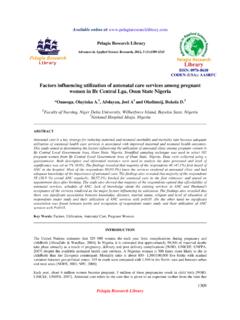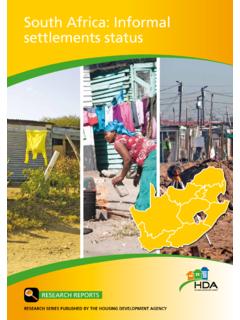Transcription of THE INFLUENCE OF CULTURE IN DOMESTIC VIOLENCE …
1 Volume: 2 Issue: 6 [December, 2017] pp. 273 - 286]. Journal of Islamic, Social, Economics and Development eISSN: 0128-1755. Journal website: THE INFLUENCE OF CULTURE IN DOMESTIC VIOLENCE . AGAINST WOMEN IN NIGERIA. Umar Abdullahi 1, Rafidah Binti Mohamad Cusairi 1, Syahrul Faizaz Binti Abdullah 1. 1. School of Languages, Civilization and Philosophy, Universiti Utara Malaysia. Accepted date: 30 October 2017 Published date: 15 January 2018. To cite this document: Abdullahi, U., Cusairi, R. M., & Abdullah, S. F. (2017). The INFLUENCE of CULTURE in DOMESTIC VIOLENCE Against Women in Nigeria. Journal of Islamic, Social, Economics and Development (JISED), 2(6), 273 - 286. _____. Abstract: DOMESTIC VIOLENCE is a global phenomenon, a human rights violation and an important public health problem that has negative effects on women's physical, mental, sexual, and reproductive wellbeing.
2 It is a social illness that cuts across all races, religions, and class status. Many societies, including Nigeria, have accepted DOMESTIC VIOLENCE as normal and a part of women's life. CULTURE , on the other hand, has shaped people's perceptions towards the menace of DOMESTIC VIOLENCE . The rate of VIOLENCE against women in Nigeria is alarming, and it needs to be addressed. This study aimed to examine the INFLUENCE of cultural practices on the prevalence of DOMESTIC VIOLENCE in Nigeria through the lens of feminist theory. This study utilized primary sources from fieldwork study where interviews have been conducted with women to collect data across the study area of Adavi, Ajaokuta, Okehi and Okene Local Government Areas of Kogi State, Nigeria, and secondary sources of literature from published journals, articles, textbooks, and internet resources, to analyse the INFLUENCE of CULTURE on DOMESTIC VIOLENCE in Nigeria.
3 Findings from this study revealed that socio-cultural practices such as norms about marriage system, the predominant position of male children, and forced marriage, have exposed women to DOMESTIC VIOLENCE in Nigeria. Ending DOMESTIC VIOLENCE , therefore, requires concerted efforts and commitment from the government and the community to address the patriarchal system at all levels. Keywords: DOMESTIC VIOLENCE , Cultural Practices, Patriarchal, Customary Marriage, Nigeria. _____. Introduction DOMESTIC VIOLENCE is a global problem and a major public health issue which has attracted the interest of researchers as well as policymakers (Ansari et al., 2016; Abrahams et al., 2014;. Kunnuji, 2014). DOMESTIC VIOLENCE is a human rights violation that affects women, families, and the society in general (Standish, 2014; Terry & Hoare, 2007).
4 It was reported by the World Health Organization (WHO) multi-country study that 15-71% 0f women had been exposed to marital VIOLENCE at one point in time or the other (Garc a-Moreno, Hegarty, & d'Oliveira, 2015;. 273. Garcia-Moreno, Jansen, Ellsberg, Heise, & Watts, 2006). Similarly, the updated report of (WHO, 2016) stated that almost 1 in every 3 of women in marital relationships has experienced some forms of VIOLENCE which could be physical or sexual, from their partners. The health, physical, sexual, and the general wellbeing of millions of women have been negatively affected by VIOLENCE with its short and long-term consequences (WHO, 2016; Semahegn & Mengistie, 2015; Colucci & Hassan, 2014). Growing body of literature has indicated that pervasive patriarchal cultures of the world have adversely exposed women to DOMESTIC VIOLENCE across the globe (Aisyah & Parker, 2014.)
5 Ansari et al., 2016; Bowman, 2003; Ishola, 2016; Kelmendi, 2015; Lee, Moon, & Gomez, 2014;. Othman, Goddard, & Piterman, 2014). In African societies, VIOLENCE against women is perceived as a private issue of marital affairs and women have been socialized into accepting it as such (Ilika, 2005; Ishola, 2016; Ofeibea-Aboagye, 1994; Oluremi, 2015). Some cultural practices in Nigeria have exposed women to all forms of abuse in their matrimonial life. Norms about marriage, predominant male positions, and forced marriages have been identified as having risk factors of DOMESTIC VIOLENCE in Nigeria (Alesina, Brioschi, & Ferrara, 2016; Chika, 2012; Linos, Slopen, Subramanian, Berkman, & Kawachi, 2013). To tackle the harmful effects of VIOLENCE on women and the society, there is urgent need to challenge this social structure and cultural practices at all levels.
6 The goal of the present study, therefore, is to empirically identify the factors that contribute to DOMESTIC VIOLENCE in Nigeria. The implications for the physical, mental and reproductive wellbeing of women and prevention of VIOLENCE are further discussed. This paper is structured into introduction, literature review, methodology, conceptual and theoretical framework, results, discussion of the findings, recommendations and conclusion. Literature Review Overview of DOMESTIC VIOLENCE in Nigeria Nigeria is one of the societies that recorded the highest rate of DOMESTIC VIOLENCE in the world (Balogun & John-Akinola, 2015; Linos et al., 2013; Aihie, 2009). It is worthy of note that, just like other developing countries, there is a paucity of information on the nationwide official statistical data on the prevalence of DOMESTIC VIOLENCE in Nigeria (Olayanju, Naguib, Nguyen, Bali, & Vung, 2013).
7 However, some studies have reported the prevalence rate of VIOLENCE with varying degree, according to regions and religions. One of the profound studies on DOMESTIC VIOLENCE in Nigeria is the National Demography and Health Survey (NDHS) of 2008. In this survey, the lifetime prevalence of VIOLENCE was , ranging from in the North to 52%. in the Southern part of the country (Balogun & John-Akinola, 2015; Nwabunike & Tenkorang, 2015). However, there are several other studies about VIOLENCE in Nigeria that reported different prevalent rate of DOMESTIC VIOLENCE . The possible reasons that accounted for these variations can be attributed to the differences in the study areas and the purpose of the research (Ajah, Anthony, Nkwo, Nwakoby, & Ezeonu, 2014). Most studies in the Southern part of Nigeria, such as Nelson (2015) and Ilika (2005), recorded high prevalence of DOMESTIC VIOLENCE largely due to the consumption of alcohol.
8 For instance, Balogun, Owoaje, and Fawole (2012) reported 64% and 70% among the rural and urban women, respectively, in south-western Nigeria. Nelson (2015) noted that consumption of alcoholism in the Southern states accounted for the high prevalence rate of DOMESTIC VIOLENCE among the women surveyed. Another nationwide study showed that 11% of the respondents had experienced DOMESTIC VIOLENCE in their lifetime 274. (Nwogu, 2015). Furthermore, Kunnuji (2014) recorded 22% as the prevalence rate of VIOLENCE among the girls and women surveyed in South-West of Nigeria. The study found that DOMESTIC VIOLENCE is more common among uneducated women. And only 17% of the informants justified VIOLENCE against in some instance such as leaving the house without permission, not respecting husbands' authority, and sexual infidelity.
9 And the common forms of VIOLENCE was recorded to be slapping (77%), kicking (40%), and shouting (93%), among the women (Abayomi, 2014;. Obi & Ozumba, 2007). Nigeria is a multi-ethnic state which is very rich in traditions and customs, with two faces of native and modern. Therefore, studies of DOMESTIC VIOLENCE in Nigeria is of immense importance because of its position in Africa (Ishola, 2016). However, in most of the Nigerian societies, the cultural practices still overshadowed the modernity in traditions (Balogun & John- Akinola, 2015; Olayanju, Naguib, Nguyen, Bali, & Vung, 2013). In their study, Balogun and John-Akinola (2015) found that patriarchal CULTURE dictates that women should be submissive to their husbands. As such, women have been socialized to ignore and accept DOMESTIC VIOLENCE as a cultural norm which needs not be challenged.
10 Women perceive physical and sexual abuse as part of marital rights of the husbands, even though it negatively affects their physical, mental and reproductive well-being, and they are likely to justify it (Iliyasu, Abubakar, Galadanci, Hayatu, & Aliyu, 2013; Chika, 2012; Ilika, 2005). The beating of wives and children, for instance, is sanctioned as a disciplinary measure in Nigeria (Abayomi, 2014; Aihie, 2009). According to Amnesty International report of 2005, women are beaten and abused on daily basis in Nigeria by their husbands or family members. With all these incidences of VIOLENCE in Nigeria, Abayomi (2014) conclude that DOMESTIC VIOLENCE is a means of subjugating women's power to conform to the leadership roles of men in patriarchal societies. Cultural Practices in Nigeria CULTURE is an organized, learned or created experience of a group of people, transmitted from past generations to another (Avruch, 1998).







